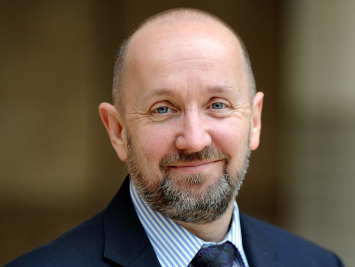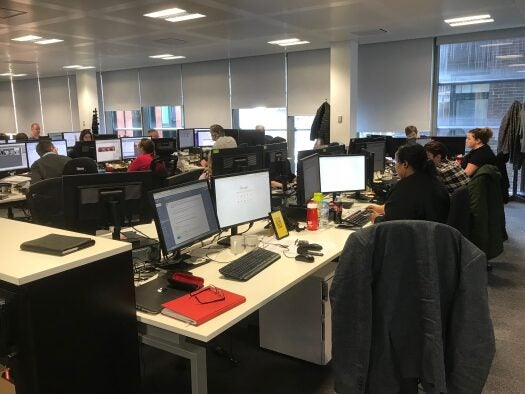
Liverpool Echo editor Alastair Machray, 57, spoke to Press Gazette about his 40-year history in the news business, his first job writing press releases as a ten-year-old and what he makes of the future of journalism…
How long have you been a journalist?
Since I was ten. My mother and father were journalists and when my mum was freelancing she made me write press releases.
What is the one thing you couldn’t do without as a journalist?
Gallows humour – that’s kept me going in the last 15 years since the tide turned and the sea got choppy. Every day I have a laugh at some point, even on horrible, horrible days.
Last year I took two brilliant journalists aside – we were restructuring and their roles were at risk. We went to my office and I closed the door. They were old hands – they knew what was coming. I tried to speak but one of them held up his hand and said: “No need for any speeches, Ali. Thanks for the pay rise. We accept.”
It was funny but he was breaking the ice, making it easy for me. I will never forget his kindness.
What made you want to become a journalist?
I wanted to travel the world and meet famous people. Also my mum and dad were journalists and seemed to have a whale of a time. I also liked the idea of covering cricket and football. When you know you’re not good enough as a player it’s the next best thing.
Where did you catch your first break?
I wanted to be a cricketer. A gnarly old pro called Alec Johnson, once of Nottinghamshire, played for my club. He took me to one side and told me I’d never make it in the first-class game. I was heartbroken but I realised he was right and threw myself into journalism.
What was your first paying journalism job?
My first paid job was as a trainee reporter on the Sunderland Echo in 1979. I turned down university as in those days jobs were hard to come by. I was on £32 a week and gave £7 board and lodgings to my mum, bought a green herringbone tweed suit and got drunk every night. Never been as wealthy.
What is it you enjoy most about journalism?
The people I work with. I love journalists. I love it when we break a big story, I love it when we affect positive change.
Away from work, where do you get your news?
I am a big listener to radio: Talksport, Radio 5 Live. It works for me as I can do other things while I consume. I have all kinds of alerts on my phone to ensure I don’t miss anything. I went to London recently and realised I hadn’t checked the news all day. When I stuck on the TV in my hotel room I was amazed to see I knew all the top items though.
How? Big screen sky headlines at Lime Street Station waiting for a train to Euston, radio in the Uber to Canary Wharf, LED ticker-tape headlines on the outside of the Reuters building at Canada Square, Evening Standard billboards. I was getting my news by osmosis. It was unavoidable.
I read newspapers from cover to cover on holiday. I don’t enjoy them when I’m at work as I’m only looking for mistakes and that’s not a leisure experience.
What piece(s) of work are you most proud of, and why?
The proudest moments of my career have been editing the Echo when the Hillsborough Independent Panel delivered its findings and when the Hillsborough Inquest in Warrington reached its verdict.
On both occasions I saw teak-tough old journos, battled hardened doorsteppers, crying in my newsroom.
I am fiercely proud of the way the Echo, during my time and before it, have stayed with the Hillsborough families when the establishment (and some of the media) turned their back.
What are your thoughts on the state of the UK media industry today?
It’s a long hard battle, but we will win it. I see newsrooms sustained by the revenues driven purely by its journalism and I see it in the near future.
I pity the companies who have not committed to an all-out digital-first strategy. Print-first may serve shareholders and owners, but it doesn’t serve communities and journalists in their 20s and 30s. Looking around regional media I would much rather be at Reach than anywhere else.
If you could change one thing about the UK media industry today, what would it be?
The keyboard haters who undermine what decent journalists are trying to do. Not just the bottom feeders on the message boards – also the industry pundits who continually talk down their own profession. Most of us want the same thing: a healthy, competitive, evolving press, but we forget that sometimes.
What’s your top tip for aspiring journalists?
The chief sub of the Evening Chronicle told me this 35 years ago: “Always do more than your fair share.”
Where did you study journalism?
Still studying. Every day. But the Sunderland Echo (Portsmouth & Sunderland Newspapers) sent me on block release to Darlington Technical College to train. I’ve been lucky to have worked with some amazing people who have taught me on the job.
Every time I raised my game to the next level it was because I saw someone doing something better than I could do it. And Reach, or Trinity as it was then, sent me to Ashridge Management College when I first became editor of the Daily Post in 1995. That was life-changing.
Show us your workspace…

I have an office, but it’s a bit lonely. I spend most of my time at this desk because it’s with people and I can feel the vibe and know what’s going on. The person I sit next to is the calmest person I’ve ever met. Which is good.
I’m three heart attacks and a quintuple heart bypass in, so I need to watch my blood pressure.
Picture: Reach
Email pged@pressgazette.co.uk to point out mistakes, provide story tips or send in a letter for publication on our "Letters Page" blog

